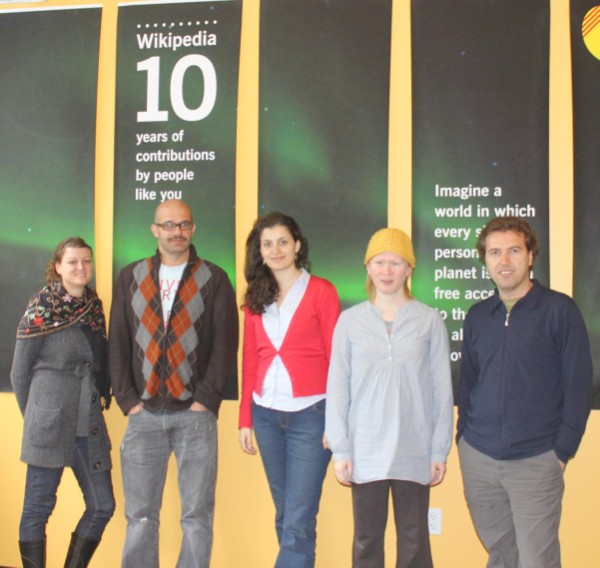I’m pleased to announce that, along with our Summer of Research team, we have five more graduate students participating in another research fellowship this summer. (See our previous announcement.)
The WikiHistories project is designed to bring together multilingual academics from diverse fields in the humanities — including history, literature, journalism, and digital anthropology — to study the historical development and community dynamics of non-English Wikipedias. Using their skills as ethnographers, historians, and writers, these researchers will be shedding light on editing communities around the world, documenting the mechanisms that different groups of editors have developed to address the unique cultural and technical issues they face. If you’re a Wikipedian from one of these communities, these researchers will need your experience to gather and fine-tune these histories, so please feel free to get in touch with them on their user talk pages on Meta.
Our team (from left to right):

- Patricia Sauthoff (Meta:cloudmessenger): Masters candidate in History at the University of London’s School of African and Oriental Studies. Journalist, freelance writer, studying religion in South Asia. Wikipedia: Hindi.
- Stuart Easterling (Meta:stoomagoo): PhD candidate in History at the University of Chicago. Creative writer, software developer, studying Mexican politics and visual arts. Wikipedia: Spanish.
- Lusine Grigoryan (Meta:Blue moon): received her MSc in Digital Anthropology at University College London. Journalist, media ethnographer interested in social media and its role in national communities. Wikipedia: Armenian.
- Meredith Ramirez Talusan (Meta:1demerith): PhD candidate in Comparative Literature at Cornell. Fiction writer, artist, translator of Philippines literature, blogger at ARCADE. Wikipedia: Tagalog.
- Ayhan Aytes (Meta:Aaytes): PhD candidate in Communication and Cognitive Science at the University of California San Diego. Digital media artist, ethnographer, interested in the cultural history of Artificial Intelligence. Wikipedia: Turkish.
Each week, the WikiHistory fellows will be documenting their findings on this blog, and at the end of the summer they will produce a detailed historical narrative that addresses critical questions that affect all Wikimedia communities: over the years, what kinds of structures and policies have been best suited to attracting and retaining editors, and what has slowed down growth or inhibited editor retention?
Starting next week, be sure to watch this space for updates from the field, as our researchers interview Wikipedians in India, Turkey, Spain, Armenia, and the Philippines and present their stories here and on the wikis.

Can you help us translate this article?
In order for this article to reach as many people as possible we would like your help. Can you translate this article to get the message out?
Start translation